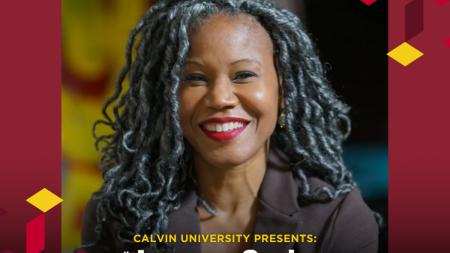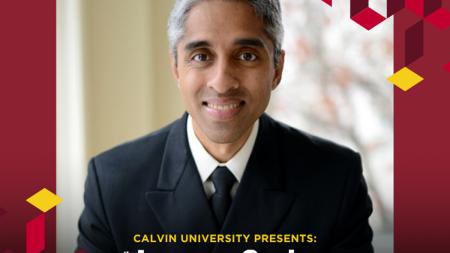Mixing Common Grace and Business

What are businesses for? Do they exist just to make money? Cambridge University researcher Peter Heslam recently asked those questions of a room of business people.
Another audience may have had a different response, saying that the role of business in today’s consumer culture is simply to make money, that money is considered to be a god.
But many of the Christian business men and women, meeting at the Prince Conference Center at Calvin College for the Symposium on Common Grace in Business, don’t see it that way.
One of the business people answered that businesses exist for the sake of the world.
Another said businesses promote the common good, while still others said businesses can be advocates for human flourishing.
Hearing these answers, Heslam smiled, agreeing that businesses can and should have these roles to play.
“Business can be a positive agent in society … Christians ought to value the transformational qualities that business can provide.”
“It is true that business can have a pervasive influence for good in culture today,” said Heslam, director of Transforming Business, a multi-disciplinary research and development project on enterprise solutions to poverty at Cambridge.
“Business can be a positive agent in society … Christians ought to value the transformational qualities that business can provide.”
Symposium Looks at Kuyper
Attended by about 100 people, the recent symposium focused on applying Dutch writer and political theorist Abraham Kuyper’s theological work on common grace—the grace God extends to everyone that enables him or her to do good—to the business world.
The conference was cosponsored by Calvin College and the Acton Institute, a nonprofit research organization that studies free-market economies in light of religious faith.
Heslam was the morning keynote speaker and Richard Mouw, former president of Fuller Theological Seminary, gave the evening keynote address.
The idea for the symposium came about as a way to celebrate the completion of the Acton Institute’s English translation of Kuyper’s three-volume work on common grace, which had never been translated into English before.
Nearly all of Calvin’s business professors contributed to scholarly papers about how common grace ties to their disciplines within business and presented their findings at the symposium. The papers will be published in a special edition of the Journal of Markets and Morality.
“Theologians have been talking about the doctrine of common grace since the time of John Calvin,” said professor of business Jason Stansbury, the convener of the conference.
“It’s foundational to our understanding of the world. This conference is an opportunity to unpack what that grace means for people in business disciplines.”
‘Every Square Inch’
Heslam works particularly closely with faculty at Cambridge’s divinity and business schools and with leaders in international business. He has also published widely, including a book on Kuyper.
In his talk, Heslam said that Kuyper’s ideas, especially that every “square inch” of the world is under the sovereignty of God, apply to economics in significant ways.
“Faith and business do mix,” he said. “We know that God calls people to specific roles, and they feel called to business.
“Faith and business do mix,” he said. “We know that God calls people to specific roles, and they feel called to business.
“The church and business can have a mutual relationship,” he said. “There are business people who refuse to separate their business practices and their theology.”
This is a message, Heslam explained, that he seeks to get across to those churches that believe businesses should be about liberating and not primarily transforming people.
Those who favor liberation often have a negative view of business, thinking, among other things, that business has no heart for its workers and that the bottom-line is what matters, he said.
But, he continued, it is important to consider that transformation, the other approach, “encourages Christians to participate in business...and to use their commercial skills to uplift society.”
Managing God’s Resources
Speaking of how he encourages Christians to view business, he said “it is a special trust from God. … We have been given the chance to manage God’s resources. I ask the church to be interested in this.”
During a question and answer session after his talk, a questioner asked Heslam to talk more about today’s business world in which it often seems wealth comes at any cost.
Heslam agreed that many businesses don’t follow the tenets of mercy, goodness, and justice as promoted in Kuyper’s notion of common grace.
But he pointed out that Kuyper believed that man is fallen and sinful, and so is the business world without God. In fact, he said, Kuyper believed common grace acts to constrain sin the world.
“We need to realize that profit is not a dirty word,” he said.
When used properly, with the guidance of and in accordance with God’s common grace, wealth can “provide more services for other Kingdom efforts,” said Heslam.
A ‘Risk-Taking God’
Sixteen business leaders, entrepreneurs, business scholars and theologians also contributed to the symposium through panel discussions held throughout the day.
Michelle Van Dyke, president of Fifth Third Mortgage Company; Sid Jansma Jr., CEO of Wolverine Gas and Oil, and Milt Kuyers, CEO of Faustel, Inc. took part in a panel in which they shared their thoughts on common grace and business. Leonard Van Drunen, chair of the Calvin business department, moderated this session.
The wrap-up for the day was a dinner with a keynote delivered by Mouw, professor of faith and public life at Fuller Theological Seminary.
Mouw spoke about John Calvin and Kuyper’s belief that common grace works in and through believers and non-believers alike, including business people.
Mouw characterized God as a risk taker and said that entrepreneurs are risk takers who have freedom to create new business solutions.
He concluded his remarks by saying people in business have their own gifts and “will create their own trophies” to be laid before God as do those serving in other spheres such as missions or evangelism.
Matt Kucinski of Calvin College contributed to this article.


